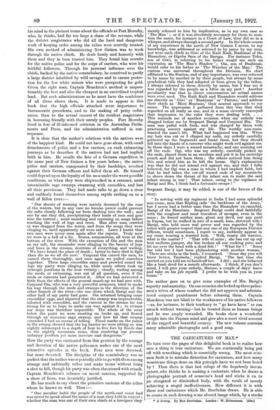BOOKS.
LAST DAYS IN NEW GUINEA.*
A YEAR ago. Captain Monckton published a most interesting and amusing book on his experiences as a resident magistrate in New Guinea. We are glad to have the continuation of his adventures in a new book which, though much shorter, is not less absorbing than the first. He now records in some detail his arduous journeys of exploration in the mountainous interior, along the former German frontier, and his ascent of Mount Albert Edward, which is over 12,000 feet high. As before, he speaks • Last Days in New Guinea : being Further Experiences of a New Guinea Resident Magistrate. By Captain C. .a. W. Monokton. London : Lane. [NS. net.]
his mind in the plainest terms about the officials at Port Moresby, who, he thinks, had far too large a share of the revenue, while the district magistrates who did all the hard and dangerous
work of keeping order among the tribes were scurvily treated. His own method of administering New Guinea was to work through the native chiefs. He dealt firmly and honestly with them and they in turn trusted him. They found him recruits for the native police and for the corps of carriers, who were his faithful followers. Through his personal influence over the chiefs, backed by the native constabulary, he contrived to pacify a large district inhabited by wild savages and to ensure protec- tion for the few white miners who were prospecting for gold. Given the right man, Captain Monckton's method is unques- tionably the best and also the cheapest in an uncivilized tropical land. But such administrators as he must have the confidence of all those above them, It is made to appear in this book that the high officials attached more importance to bureaucratic precedents, and to the making of -petty ordin- ances, than to the actual success of the resident magistrates in becoming friendly with their unruly peoples. Port Moresby lived in fear of ill-informed criticism in the Australian Parlia- ments and Press, and the administration suffered in con-
sequence.
It is clear that the author's relations with the natives were of the happiest kind. He could not have gone alone, with small detachments of police and a few carriers, en such exhausting journeys as he describes if the natives bad not had implicit faith in him. He recalls the fate of a German expedition in the same part of New Guinea a few years before ; the native police and carriers, exasperated by their hardship, revolted against their German officers and killed them all. He himself could depend upon the loyalty of his men under the worst possible conditions, as when they were shipwrecked in a cataract, amid interminable sago swamps swarming with crocodiles, and lost all their provisions. They had made rafts to go down a river and suddenly found themselves among rapids rushing on to a wall of fallen trees :—
" Our shouts of warning were mainly drowned by the roar of the waters, but in any case no human power could prevent the rafts closely following me from dashing into the wall ; and one by one they did, precipitating their loads of men and gear into the torrent - some smashing and capsizing on snags before reaching the wall of logs and trees. after man crawled or was dragged from the water, and from the snags they were clinging to, until apparently all were safe. Later I learnt that two men were never seen again after the capsize. Truly now we were in a hell of a fix. Stores, ammunition, all were at the bottom of the river. With the exception of Oia and the men on my raft, the remainder were clinging to the barrier of logs and trees in the stream, destitute of everything, and wailing, ' We have found the place of death ; better to have died in fight than die as we all die now.' Corporal Oia cursed the men, he cursed them thoroughly, and once again we pulled ourselves together. Three large crocodiles came and prowled round the logs my party were clinging to, while many others took up strategic positions in the near vicinity ; clearly, wading among the reeds, or swimming, was out of all question, even if the reeds or currents had permitted it. After we had recovered a little from the effects of the general smash-up we had met with, Corporal Oia, who was a very powerful swimmer, tried to make his way through the reeds and swamps in the direction of the other branch of the river—the one down which Barigi and the other half of my party had gone. Oia returned bringing some crocodiles' eggs, and reported that the swamp was impenetrable, infested with crocodiles, and the current in the stream far too strong for us to hope to make our way against it ; to retrace our steps was therefore impossible. The whole of the river below the point we were roosting on broke up, and flowed through an immense sago swamp, and how far that swamp extended I had no means of telling. Flood marks on the palms in the swamp showed that the log barrier we were sitting on was nightly submerged to a depth of four to five feet by floods due to the nightly mountain rains, thus rendering our present unhappy position yet more insecure and dangerous."
How the party was extricated from this position by the courage and devotion of the native policemen makes one of the most attractive episodes in the beck. Four men were drowned, but none- deserted. The discipline of the constabulary was so perfect that the author was repeatedly able to go with them among strange and unfriendly tribes and make terms 'without firing a shot to kill, though his party was often threatened with attack. Captain Monckten's reliance en moral suasion, supported by a show of force, was invariably justified.
He has much to say about the primitive customs of the tribes whom he knows so well. Thus :-
" One peculiar habit the people of the north-east coast had was never to speak aloud the name of a man they held in respect ; whether the man was one of their own chiefs or a foreigner they merely referred to him by implication, as in my own case as ' The Man ' ; or if it was absolutely necessary for them to men- tion the name, for instance in a Court of Law, they did so in a whisper, and always through a second party. In the whole course of my experience in the north of New Guinea I never, to my knowledge, was addressed or referred to by name by my men, nor were such chiefs as Giwi of the Kaili Kaili, Buslumai of the Binandere, or Oigoba Sara of the Baruga. For instance Toku, son of Giwi, in referring to his father would use such an expression as ' The Man's Shadow ' ; Oia, son of Bushimai, would refer to his father as The Watcher of the Man.' The custom was universal throughout the Division. No chief affiliated to the Station, and of any importance, was ever referred to by name by another or by their people, but always by some symbolical title they had adopted or been given by the tribes. I always referred to them directly by name, but I fear me it was regarded by the people as a Miss on my part ! Another peculiarity was that in direct conversation no actual names were ever used. The Kaili Kaili and Binandere would address me directly as Giwi ' or Bushimai ' or Paitoto,' and address their chiefs as Missi Montane,' their nearest approach to my name. The impression I gathered from this was that they regarded us all really as one, and in a sense cleverly conveyed that impression to the ruler they were dealing with. . . . This reminds me of another occasion when my orderly was dragged before me by Sergeant Barigi and Corporal Bia. The man was pallid with funk-, and was charged- by them with practising sorcery against my life. The worthy non-corns. wanted the man's life. What had happened was this. When my hair was cut or I clipped my nails, my orderly carefully gathered up the fragments and burnt them, lest they should, fall into the hands of a sorcerer who might work evil against me. In those days I wore a waxed moustache, and one morning cut off the ends. Ogi, who was my orderly, carefully picked up the ends, placed them in an envelope and put it in his cartridge pouch and did not burn them ; the others noticed 'him doing this and seized him as he left the house. Ogi's explanation was that he did not intend evil against me, and that I fully believed, for Ogi was a man in whom I had implicit faith, but that he had taken the cut-off waxed ends of my moustache to shove down the throat of. his infant son to make the said infant strong in war ! That infant, owing to the vigilance of Barigi and Bia, I think had a fortunate escape I " Sergeant Barigi, it may be added, is one of the heroes of the story.
" In serving with my regiment in India I had some splendid non-coms., men that Kipling calls ` the backbone of the Army,' but I never had a better man than the Binandere ex-cannibal, Barigi of the Mambare. Sergeant Barigi could deal faithfully with the roughest and most truculent of savages, even in the mass ; he feared neither man, ghost nor devil, nor .any peril in Papua, but he walked in awe of a small, lean, shrewish wife I Barigi, who held more real power and was regarded by the tribes with greater respect than any one of my European District Officers, would sometimes, I regret to say, suddenly appear in my room wearing a worried look. ' Well, trusty old warrior, what is the matter ? ' That wife of mine ; she has cut up my best uniform jumper, she has broken all our cooking pots, and hit me over the head with a dead fish ! " What for ? " Some liar told her I had been philandering with another woman.' There are sticks in the bush,' I remarked. ' Some day you will know better, Taubada,' replied Barigi. The last time she carried on you told me to handcuff her. I did - and she behaved like a bush devil for a month afterwards. I- think, if you don't mind, I will give your orderly, Malone, a couple of days' leave and take on his job myself. I prefer to be with you in your house.' " The author goes on to give some examples of Mrs. Barigi's asperity and austerity. On one occasion she locked up three police- men's wives of whose conduct she did not approve and adminis- tered corporal punishment before releasing them. Captain Monckton was not blind to the weaknesses of his native followers —as, for instance, to their tendency to "go kava kava " or run amuck without warning—but he treated them as human beings and he was amply rewarded. His books show a wonderful insight into the Papuan mind and give also a most vivid account of the rugged and beautiful scenery. The new volume contains many admirable photographs and a good map.



































 Previous page
Previous page